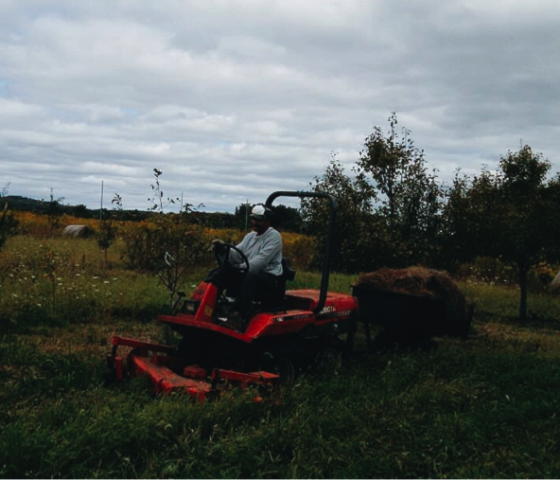Regenerative Agriculture at Ironbound Farm
Growing apples and making cider are not new occupations in Hunterdon County. Two hundred years ago, Hunterdon farmers were making a lot of cider that they either drank on the farm or turned into apple cider vinegar and brandy. In 1819 alone, over 170,000 bushels of apples were used to make brandy in Hunterdon County. Much of that brandy was sold to local taverns like Hickory Tavern, which, for almost a century, sat just up the hill from our farm.
In Rural Hunterdon, the late Hubert Schmidt, a professor of history at Rutgers-Newark, explained that Hunterdon’s farmers turned to growing apples for brandy, in part, because they had destroyed their fields. “The increased production of corn and wheat combined with lack of knowledge of the nature of the soil led to land exhaustion,” he wrote. ”By the end of the eighteenth century, the dire effects of poor crop practices were very noticeable.”
From the dead zone in the Gulf of Mexico to the rapid loss of topsoil, the environmental impact of poor farming practices are still visible today. Multi-national agro-chemical-seed giants try to fix those problems with new products and technologies, like stronger pesticides and genetic engineering. This is NOT working.
So, we’ve chosen a radically different, regenerative approach to enhancing the environmental impact of our agricultural activity at Ironbound Farm. Instead of looking to industry for answers, we look at how nature works in order to figure out the best way to manage our farm. Rather than force-feeding plants with synthetic fertilizers to increase their output, we encourage an abundant diversity of life in our soil. Those soil organisms, in turn, give our trees access to all the minerals and nutrients they need to thrive. Above ground, we seed our orchard floor with plants that attract beneficial insects to help with pollination and pest control. We figure that if our trees have what they need, they’ll be able to produce beautiful, tasty, nutritious, abundant fruit. And, instead of sucking the life out of our soil, this kind of farming actually heals the land—making our farm healthier and more productive over time. It also creates a much safer, healthier work environment for our crew.
Pete, our chief orchardist and farm manager, explains what regenerative agriculture looks like on Ironbound Farm: “In clearing our land to plant our orchards, we have disturbed the soil as little as possible, and are now working toward mimicking what nature would do to heal the land, and store as much carbon as possible. At planting time we added several key minerals that were found deficient by soil testing, as well as adding a mycorrhizal fungi inoculation, which is a key component of the soil food web in stabilizing carbon in the form of humates. A liquid drench of fish, seaweed, microbes, yucca and molasses was added to feed the microbes that support root growth and biological activity in the soil. Broadcasting minerals and a fall root drench will further re-mineralize the soil, and help make those minerals available to the plant/microbe interface. Other organic practices to build a high percentage of organic matter are being used such as adding worm compost with additional humates, and mulching with aged wood chips. And we’ve used minimal tillage–only tilling once–and then cover cropping with a diverse mixture of understory plants that will support our pollinators and beneficial insect populations. This coming spring, we’ll begin a foliar nutrition program aimed at maximizing the photosynthetic capability of our trees. This will not only enhance tree growth, it will also improve our soil health. We are striving to grow healthy crops by growing healthy soil, resulting in a healthier environment and community.”
New Jersey’s orchards are plagued by every known apple disease and pest. It’s a huge leap of faith for us to count on good management, plus abundant soil life, to make our trees so healthy that disease and pests can’t get a foothold. For the sake of our farm and our community, that’s a leap we’re happy to take.
More Stories:
Sources of Our Apple Trees
It is because of these, and other dedicated apple preservationists, that we have been able to fill our orchards with legendary New Jersey varieties.
Curriculum Collaboration with Rutgers and PS&D
The pool of knowledge continues to grow as we recruit more experienced professionals to join our board.
